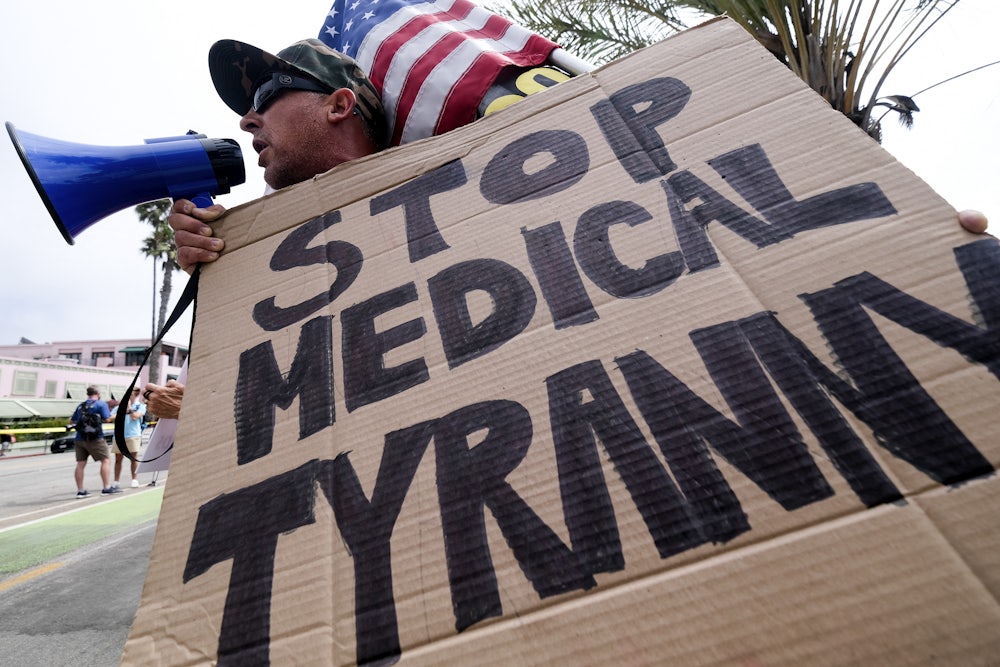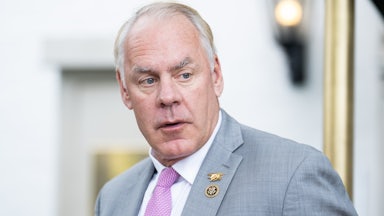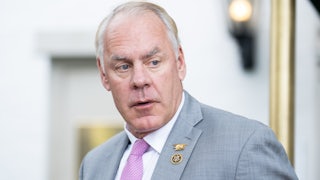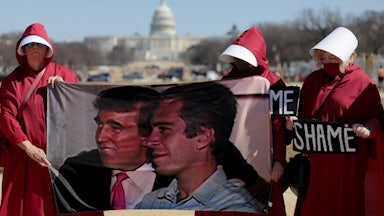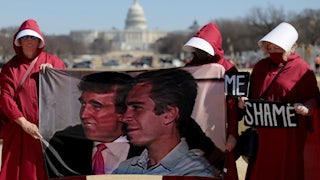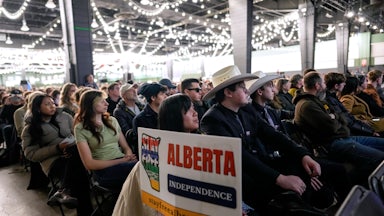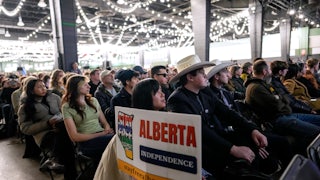More than 670,000 Americans have now died from Covid-19 in the last 18 months, with thousands dying in recent weeks even though a safe and effective vaccine is widely available. Americans have not died in such numbers since the Spanish flu pandemic 100 years ago or the Civil War 50 years before that. For most, this is a moment of profound tragedy and inescapable grief.
And yet for some, such as Jackson Lahmeyer, a 29-year-old pastor and Republican candidate for office in Oklahoma, it’s an opportunity. Lahmeyer recently announced on his website that he would offer forms for individuals who want religious exemptions from vaccine mandates and sign them in exchange for donations to his church. “What if someone says, ‘God told me not to get a vaccine,’” he told The Washington Post in an interview last week. “I don’t know if God told them that. I’m not going to argue with that.”
As the public and the government lose patience with vaccine-hesitant groups and increase pressure on them to get the shot, the questions surrounding religious exemptions will almost certainly grow. It’s possible that most of the holdouts will begrudgingly comply with mandates so they can work and participate in normal life. But it’s also likely that some of these claims will end up in court, where judges will have to balance the interests of the sincerely faithful against our public health needs, and determine who among the refuseniks have genuine religious objections and who is merely fighting a culture war through different means.
There is evidence that vaccine hesitancy does differ among religious groups. A July survey by the Public Research Research Institute found that around 80 to 85 percent of Catholic and Jewish Americans said they accepted the vaccine, while 75 percent of religiously unaffiliated Americans took the same stance. Roughly two-thirds of Latter-Day Saints and Black Protestants favored vaccination in the same survey. The lowest acceptance rates were among Hispanic Protestants and white evangelicals, among whom just over half of adherents describe themselves as favorable toward the vaccine.
There are also signs that faith leaders can play an important role in fostering vaccine acceptance. In August, the Church of Jesus Christ of Latter-Day Saints issued a statement urging followers to receive the shot. “To provide personal protection from such severe infections, we urge individuals to be vaccinated,” the church’s three leading figures said. “Available vaccines have proven to be both safe and effective. We can win this war if everyone will follow the wise and thoughtful recommendations of medical experts and government leaders. Please know of our sincere love and great concern for all of God’s children.” In Utah, where vaccination rates had lagged below the national average, a noticeable uptick in new vaccinations soon followed.
One advantage for those proposing vaccine mandates is that no major religious group forbids vaccination outright, even two Christian denominations that are well known for refusing some medical practices on religious grounds. Jehovah’s Witnesses, who oppose blood transfusions on biblical grounds, view vaccination as a “personal choice.” The Christian Science movement, which generally uses prayer in lieu of medical treatment, recently noted that it has “appreciated vaccination exemptions and sought to use them conscientiously and responsibly when they have been granted.” At the same time, it said that it “isn’t a dogmatic thing” and that members are “free to make their own choices on all life-decisions, in obedience to the law, including whether or not to vaccinate.”
But that does not mean there won’t be grounds for challenges from members of larger denominations. Some Catholic bishops in the United States, for example, raised concerns earlier this year about the use of fetal cell lines in vaccine development. Cell lines derived from two Dutch abortions in the 1970s and 1980s played a role in researching and creating the vaccines from Pfizer, Moderna, and Johnson & Johnson. (Pfizer and Moderna only used the cell lines to test their efficacy.) The Vatican’s leading doctrinal organ issued a statement last December that asserted receiving the vaccine was still “morally acceptable” to combat the spread of the virus in the absence of a more ethical alternative. And Pope Francis described the Covid-19 vaccines as “an act of love” and “a simple but profound way of promoting the common good and caring for each other, especially the most vulnerable.”
Non-Catholics like Lahmeyer aren’t obligated to follow the Vatican’s view on the matter, of course, but even some Catholics are resisting the church’s stance. Earlier this month, a group of Catholic doctors and nurses (along with one Baptist nurse who happened to agree with them) in New York sued the state to block its mandate for health care workers to get vaccinated, citing religious grounds. In their complaint, they stated they sided with “certain Catholic bishops” who oppose vaccination because of the fetal cell lines. “[We] do not accept the opinion—expressed by certain other Catholic bishops, the Pope included—that there is a therapeutically proportional reason to resort to abortion-connected vaccines which can justify ‘remote’ cooperation in abortion,” the plaintiffs explained. A federal judge granted their request for a temporary restraining order against the mandate while legal challenges work their way through the courts.
Another complicating factor is the legitimacy of those beliefs. According to the National Conference of State Legislatures, all but a handful of states allow for religious exemptions to vaccine mandates for schoolkids. But there is some evidence to suggest that a notable number of parents who invoke religious exemptions do so under false pretenses. In a 2014 law review article, University of California, Hastings law professor Dorit Rubinstein Reiss found multiple examples of parents in anti-vax Facebook groups and internet forums who candidly told one another that they lied about their religious beliefs to claim an exemption and told others how to do it. Outbreaks of once-vanquished childhood diseases like mumps and measles led California to scrap its nonmedical exemptions for vaccines in 2015.
It’s unclear exactly how these religious exemptions—and all the complexities that come with them—will unfold in the courts. Laws vary from state to state, and even the federal government is playing catch-up. “An agency may be required to provide a reasonable accommodation to employees who communicate to the agency that they are not vaccinated against COVID-19 because of a disability or because of a sincerely held religious belief, practice or observance,” the government said in its guidance for federal employees on the Biden administration’s recent mandate for most federal workers. The guidance said that agencies can consider “the basis for the claim” when considering exemptions, as well as the effect on job duties and workplace safety. “Additional guidance on legally required exceptions will be forthcoming,” it conspicuously added.
Private sector workers are not technically under a federal vaccine mandate even after the Biden administration’s high-profile announcement earlier this month. The expected Occupational Safety and Health Administration rule will simply require companies with more than 100 employees to test unvaccinated workers on a weekly basis. The rule is expected, however, to pressure companies to impose vaccine mandates of their own. In a lengthy rundown of Covid-19 policies and practices earlier this year, the Equal Employment Opportunity Commission said that federal anti-discrimination laws like Title VII do not generally bar companies from imposing vaccine mandates on their workers.
At the same time, the EEOC explained that companies must provide reasonable accommodations to workers who request a religious exemption to the Covid-19 vaccine unless it would pose an “undue hardship” for the employer. “However, if an employee requests a religious accommodation, and an employer is aware of facts that provide an objective basis for questioning either the religious nature or the sincerity of a particular belief, practice, or observance, the employer would be justified in requesting additional supporting information,” the EEOC noted.
The Supreme Court, for its part, has not taken up a case on religious exemptions to vaccine mandates. Jacobson v. Massachusetts, the seminal 1905 case where the justices upheld an anti-smallpox mandate in Cambridge, centered on medical objections to the vaccine instead of spiritual ones. Perhaps the most notable instance in which the high court brushed against the issue came in 1992, in Employment Division v. Smith, where the court rejected Free Exercise Clause challenges to what it described as “neutral laws of general applicability.” That case involved a challenge by two Oregon men to a state law that denied them unemployment benefits for using peyote, which has sacramental uses in the Native American Church.
Antonin Scalia, writing for the court in Smith, rejected the use of the Free Exercise Clause to bypass basic acts of governance. “The rule respondents favor would open the prospect of constitutionally required religious exemptions from civic obligations of almost every conceivable kind,” Scalia noted, listing off all sorts of general laws from which various litigants have tried and failed to obtain religious exemptions—traffic laws, child labor laws, and “compulsory vaccination laws”—in his parade of horribles. “The First Amendment’s protection of religious liberty does not require this,” he concluded. Though his reference to vaccine mandates does not carry the full weight of precedent, it underscores how the court generally viewed them before the right turned them into a culture-war issue.
At the same time, Smith also highlighted the perils that come with these types of cases. Scalia argued that the alternative would be for courts to constantly scrutinize and weigh individual litigants’ religious beliefs. “It is no more appropriate for judges to determine the ‘centrality’ of religious beliefs before applying a ‘compelling interest’ test in the free exercise field, than it would be for them to determine the ‘importance’ of ideas before applying the compelling-interest test in the free speech field,” he wrote. “What principle of law or logic can be brought to bear to contradict a believer’s assertion that a particular act is ‘central’ to his personal faith? Judging the centrality of different religious practices is akin to the unacceptable business of evaluating the relative merits of differing religious claims.”
Employment Division v. Smith is controversial among some conservative legal scholars for closing off judicial remedies for certain religious freedom claims. Congress restored many of them through federal legislation with the Religious Freedom Restoration Act soon thereafter. The justices declined to overturn Smith when given the opportunity earlier this year in Fulton v. City of Philadelphia. In a concurring opinion, Justices Amy Coney Barrett and Brett Kavanaugh said it was not necessary to resolve the dispute before them and raised concerns about what the post-Smith landscape would look like for religious freedom claims. With three new justices in a four-year timespan, the court is still getting its bearings on where it now stands.
As I’ve noted before, the Roberts court has largely avoided the impulse to micromanage public health measures aimed at ending the pandemic. And in recent years, the Supreme Court has been markedly more friendly toward religious freedom claims in general. One scholarly survey of cases found that the Roberts court ruled in favor of such claims roughly 81 percent of the time, a success rate higher than under any previous generation of justices in the last 70 years. These two tendencies may now be on a collision course; one will, eventually, have to give way.
